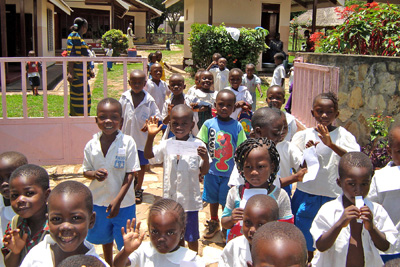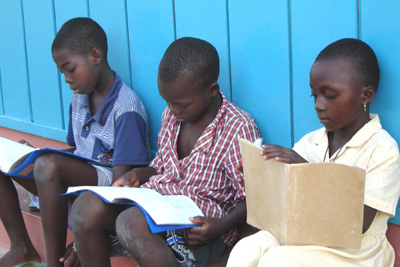Learning for Life
18/08/2008

As an actor in civil society, SOS Children has decided to invest more in education from 2009 to 2016. This will particularly affect children who are at risk of losing or have already lost their parents.
While going to school every morning is normal for most children, to millions of girls and boys this remains an unfulfilled dream. According to recent UNICEF estimates, approximately 93 million children worldwide have no access to any schooling, and World Vision states that at least one third of these children are handicapped. Many people, not least children, are deprived of the right to an education.
One of the eight United Nations 'Millennium Development Goals' is to allow free access to basic schooling for all. However, in reality the situation is different. A recent UNICEF report on the situation of children and young people in the world makes it perfectly clear: over the past ten years an average of 12% of the worldwide GNP was spent on defence, while only 6% was spent on education. Girls in particular face barriers to education. Of the estimated 800 million adults world wide who are still lacking basic literacy skills, more than two thirds of them women (UNICEF 2007).

SOS Children places central value on education and continues to help meet the Millennium Development Goals by working to provide educational assistance to children growing up in our Children's Villages, those participating in any form of family strengthening programme, and all vulnerable children and young people in the communities we work in.
In the Central African Republic, the impact of HIV/AIDS on children is increasing rapidly, as is the rate of children who have been orphaned as a result of this pandemic and the vulnerabilities that come with their conditions. The country has 140,000 AIDS orphans, 24,000 children with HIV, and 6,000 orphans and other vulnerable children living on the streets. In addition to living with the burden of the stigma and discrimination, the majority are left to their own devices and are deprived of their most basic rights, such as the right to education, as a result of care structures that are in a state of neglect. So, in 2006, SOS Children, through its Family Strengthening Programme, launched an education programme for orphans and vulnerable children in order to give them the chance of a better future.
The programme is intended to promote equality in terms of access to knowledge, in an environment in which access to education is characterised by great inequality, which depends on social background. The children are mainly selected from the beneficiaries of the Family Strengthening Programme, i.e. HIV/AIDS orphans, children with HIV, children heading households and those living with one/both parents who is/are terminally ill. The lessons take place on the premises of the SOS Hermann Gmeiner Primary School at Bangui from 1 p.m. to 4.30 p.m. from Monday to Friday and from 7.30 a.m. to 11.30 a.m. on Saturdays.
Relevant Countries: Central African Republic.